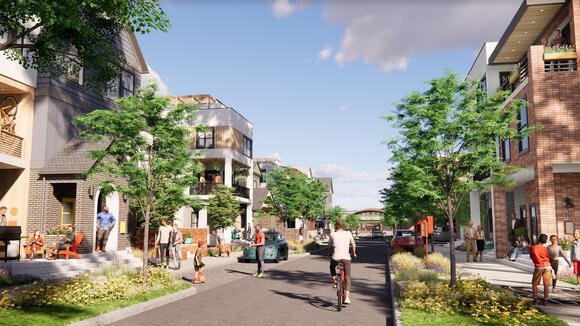By Eric Heinz
Denver residents will once again be asked about what they would like to see happen to the 155 acres of the former Park Hill Golf Course (PHGC).
The City Council recently voted to approve the creation of five metro districts within the former golf course land, approved new zoning for the area, and they approved the ballot measure that will ask Denver voters whether the conservation easement on the land should be lifted.
The vote is required after Denver voted in 2021 in favor of requiring a citywide ballot measure to determine the dissolution of conservation easements on park land, with PHGC having the only one in the city. Without the approval of the voters, the easement would stay in place and development would essentially not be able to move forward. Opponents to the developments have argued that state statute rules over the conservation easement, not city government.

The development team of Denver-based Westside Investment Properties and The Holleran Group is aiming to build a series of multifamily, mixed-use buildings, between five and 12 stories high, and structures that can house retail and a grocery store, while keeping at least 100 acres of the area as park space. The park space would primarily be to the east of the developments, and the buildings would hug the west edge of the property.
There are also plans to update the mobility and infrastructure in the area. As part of a community benefits agreement (CBA) in which the developers have committed to making space for the grocery store, the greater of 12,000 square feet or 10% of the commercial square footage will be dedicated as below-market commercial space for local women and Black, Indigenous and People of Color (BIPOC)-owned businesses.
A protest petition was filed with the city by opponents of the zoning, but the city deemed that it was not valid due to a discrepancy with the signatures filed. Opponents to the development, headed by the group Yes for Parks and Open Space, want to keep the conservation easement in place so the entire property can remain a public park.
Westside paid $24 million for the PHGC land in 2019. The development team recently began their campaign for the April 4 election, as their messages have been populating advertising in online segments. The council voted heavily in favor of each of the items, with the metro districts receiving a 9-4 vote, the zoning receiving a 10-3 vote and the ballot measure receiving an 11-2 vote.
Councilman Kevin Flynn said PHGC, historically, was unusable by the neighborhood as it was unaffordable recreation. The neighborhood has primarily Black residents in North Park Hill.
“Only with rezoning does that 100 acres of publicly accessible open space become publicly accessible,” Flynn said. “Without the rezoning, it stays a private golf course, accessible by only those who can pay.”
“Whatever we do here tonight, the public gets to have its say, and that’s what decides it,” Flynn added. “It’s going to be up to the people, not us, and I believe it’s up to us to pass it on to them for their decision.”
Councilwoman Candi CdeBaca said the rezoning would be in conflict with the criteria set forth by the city, and that it would take away green space from the neighborhood.
“We are paying a .25% sales tax since 2018 from (a ballot measure) to protect and expand park space, green space, open space,” CdeBaca said. “This entire corridor along 40th that leads to the 38th and Blake station is developing. What will we do when we don’t have enough green space for all the development that’s coming along that corridor?”
CdeBaca also said there’s cause for concern because the area does not have a transportation management plan in place, which could affect the residents who move there.
Within the metro districts, residents and commercial tenants will have to pay an assessment that will fund the maintenance district that the developers plan to bond out to create the livable and commercial spaces. Those who are in income-restricted properties will be exempt from the assessments.

Be the first to comment